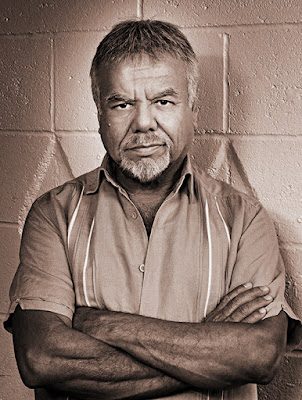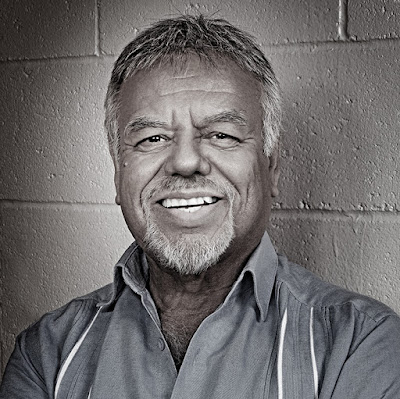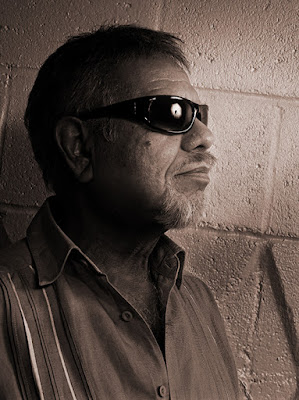All contemporary photos: Alan Mercer
Little Joe Y La Familia has been one of the most popular Tex-Mex bands in the music industry. Multi-Grammy winning Little Joe has been entertaining more than 40 years and has been described as the "KING OF THE BROWN SOUND." He has also helped pioneer "Tejano" music, a mix of traditional "norteno" music and country, blues and rock styles.
Jose Maria DeLeon Hernandez "Little Joe" was born to Salvador "La Cotorra" Hernandez and Amelia Deleon Hernandez in a three-wall dirt floor car garage in Temple, Texas on a cold stormy night on October 17,1940. His father, Salvador, was known as "La Cotorra" (the parakeet) and was a troubadour. His mother, Amelia DeLeon, was a trained pianist. He was the 7th child of 13. In 1953, Joe's cousin, David Coronado, who fronted the band "David Coronado & The Latinaires" recruited Joe for guitar, Cino Moreno on drums and Tony Matamoros on saxophone to join his band.
Two years later, he performed his first paid gig with the band at a high-school sock hop in Cameron, Texas. In 1958, Little Joe made his recording debut with the song "Safari," released by Torrero Records in Corpus Christi, Texas. The following year, Little Joe's brother Jesse joined the band on bass and vocals. When Coronado left shortly afterwards, Little Joe assumed leadership of the group.
Throughout the early '60s, Little Joe led the band through a series of recordings on small independent labels. He underwent a personal transformation after Jesse died in an automobile accident in 1964. Determined to achieve commercial success, he altered his musical approach to include more rock and blues influences, not realizing how high his music would take him, how it would open many doors for other artists or how he would set many trends.
In 1968, Little Joe formed two labels of his own: Buena Suerte for recordings in Spanish, and Good Luck for recordings in English. He later added a third label, Leona Records. His musical approach shifted again in 1970. After playing and spending much time in San Francisco and the Bay Area, Joe discovered "Latinismo", a strong Latin musical world which was not found in Texas at that time. It had profound change in his music and his cultural values which prompted him to change the name of his band from The Latinaires to "La Familia." Joe wanted more knowledge on his heritage and his roots.
By the early twenty-first century Little Joe y La Familia had amassed a large following across the state and nation. The band’s performances drew audiences from 38,000 to 50,000 for concerts at the Houston Livestock Show and Rodeo, the Houston Astrodome, and Fiesta Broadway. In addition to its regular performance schedule, the group appeared at major festivals in Arizona, California, Colorado, Illinois, Kansas, Michigan, New Mexico, and Texas. As of 2015 the band continued to perform in a variety of venues.
The Smithsonian Institute and the John F. Kennedy Center for the Performing Arts have hosted the band during National Hispanic Heritage Week. In 1997 Little Joe received the Governors Award from the Texas branch of NARAS (National Academy of Recording Arts and Sciences) for his contributions to the legacy of Texas music. He received the Smithsonian’s Lifetime Legend Award in 2001. Little Joe y La Familia was recognized with a 1991 Grammy for Best Mexican-American Album for ‘Diez y Seis de Septiembre’ and a 2008 Tejano Album of the Year Grammy for ‘Before the Next Teardrop Falls.’ The band also received other Grammy nominations in 1988, 1993, 1999, and 2003. Their ‘Recuerdos’ won a Best Tejano Album Grammy in 2011.
Little Joe spent his childhood as a migrant field laborer and is a longtime supporter of Cesar Chavez and United Farm Workers. The artist found STAR a similar cause that hit him and his musician collaborators right in the pocket. After over four decades in the music business, Hernandez has cut some 50 albums and has been involved in arranging session fees for many musicians, especially when running his own label, Buena Suerte.
Alan Mercer: Little Joe, I know you started performing when you were a teenager. Was there ever going to be anything else for you to do in life other than singing?
Little Joe: Well there were other options, (Laughter) but they were limited and not very good. It’s was all about picking cotton and doing construction work.
AM: So you didn’t even want to do anything other than perform?
LJ: Actually, I didn’t plan for this life Alan. I’m still amazed by how and what has transpired in my life. In 1955 when I first played with a four-piece band, we made $22.50, so we split the $20 between the four of us and the extra $2.50 was for gas to go to Cameron, Texas and play a sock hop. I was so impressed that somebody would pay me that kind of money for playing guitar.
AM: Did you not sing?
LJ: No, I was too shy to sing at that time. So anyway, I consider that time between that first paid performance in 1955 up to 1960, as rehearsal.
AM: When did you start recording?
LJ: My first recording was done in Corpus Christie in 1958 and again it was an instrumental. I didn’t really know if I could sing or if I could, then how well. So that’s how that went down.
AM: Was this under the moniker of Little Joe and the Latinaires?
LJ: No, 1960 in San Antonio is when I first recorded under the name Little Joe and the Latinaires. In 1955 when I first started, my dad was incarcerated for possession of four Texas Tea joints. He was sentenced to four years and he served 28 months of that. It was necessity that made me overcome any obstacles that I was timid about.
AM: You came from a musical family, correct?
LJ: Yes, I did love music and music was always in my father’s home. My whole family was into music, all my brothers and sisters and aunts and uncles and grandparents were playing instruments and singing pretty much all the time. Still, I never thought about making it my career.
AM: Did you enjoy performing back then if you were shy?
LJ: I vividly remember throwing up before going on stage due to butterflies in my stomach. I didn’t mind being a background player but I wasn’t prepared to face the public and sing. Then my career just took off. Little Joe and the Latinaires became really popular so I never had time to consider doing anything else.
AM: Were you prepared to be the leader after your cousin left?
LJ: Not at all. (Laughter) It just dropped in my lap like so many things have in my life.
AM: Can you talk about your brother Jesse?
LJ: He joined the band and then died in a car accident at the age of twenty.
AM: Did that make you more determined to be successful?
LJ: Totally, because it was his idea to see me as the star or front man. Now that I can look back and understand things better, I can see how incredibly talented he was. He was playing piano and bass and writing songs, all without any training.
AM: Did he believe you had the same talents and passions?
LJ: He pushed me to front the band when I was working at a manufacturing company that made pants. I got him a job there and he surprised me one day when he told me he was going to quit and devote his time to music. He put a lot of unintentional pressure on me. I wanted to look after my little brother, so he unknowingly forced my hand to give up my day job and work harder at playing music and I’m so grateful that he did. When he died I promised him right there at the grave site that I would stay with it and take the group to the top. I had no understanding of what I was saying.
AM: I think you did just that and took yourself to the top!
LJ: I’m still working on it. My first Grammy is dedicated to Jesse’s memory. That is what he wanted. He could foresee Little Joe being a star.
AM: Are you a believer in a higher force?
LJ: I’m not superstitious or religious but I think I am a spiritual person. I’ve always felt his presence. Sometimes I still dream about him and when I do it’s so real. I have these conversations with him and then I wake up and go,” Wow!” Also, I’ve been in certain dangerous situations like falling asleep while driving, and I know someone is watching over me. I’ve always felt that he is looking after me.
AM: You’ve kept your promise to him, that’s for sure.
LJ: All these years later I never quit no matter what happened because of Jesse. Now I don’t have to be concerned about the future anymore. I get to just live life now.
A shot inside the Little Joe Y La Familia Museum in Temple, Texas
AM: I think it’s fascinating that you were good friends with Cesar Chavez. Can you tell me about that?
LJ: I met Cesar over the phone before I met him in person. I was playing a show in California so I did a radio interview on the phone from the venue. The DJ started talking about Cesar Chavez being a communist so I defended him. The DJ got a little hot under the collar when that happened but I finished the interview and got back to soundcheck. I got a call back on the phone and I thought the DJ didn’t get enough, but when I answered the phone, it was Cesar Chavez. He had been listening to the interview and he called to thank me for defending him and for the kind words about him.
AM: Wow! How did you feel when it was him on the phone?
LJ: I was freaked out. Shortly after that I started playing fund raising concerts for him in the Bay area. We became really good friends. I’m so proud and honored that I could call him a friend as he did me. I’m still in contact with the family. After all these years I’m on call for the farm workers in whatever way I can assist. I make myself available wherever I can.
AM: Just one of the things that makes you so great Little Joe!
LJ: So many people need someone to speak on their behalf. I think those of us who have had the opportunity and good fortune to have a light shine upon us should share with the less fortunate. There are so many people that are just forgotten. I know this for a fact because I was a cotton picker so I know the feeling. I’ve been there. As a matter of fact, I have always referred to myself as a cotton picker with a side gig in music.
To learn more about Little Joe visit his website








